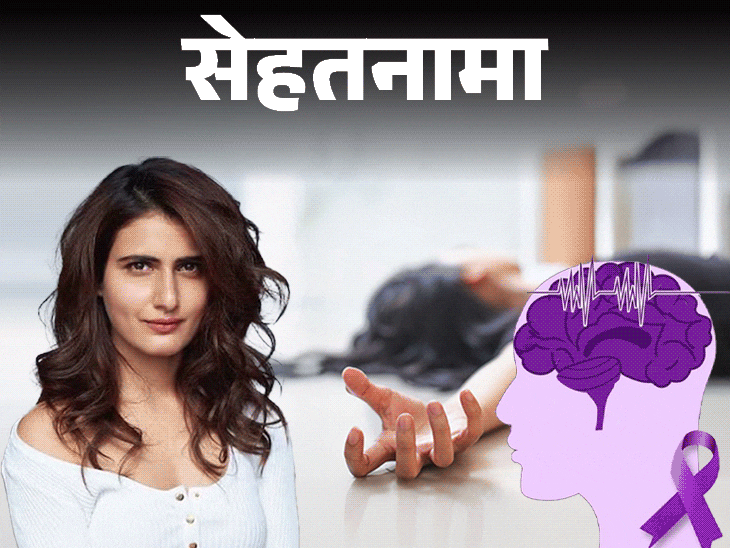9 minutes agoAuthor: Gaurav Tiwari
- copy link

Dangal girl Fatima Sana Shaikh has recently talked about her disease Epilepsy. He told in an interview that he came to know about his disease during the shooting of the film Dangal. She also told that initially for a few days she could not accept that she might have a disease like epilepsy. Therefore, initially he did not take any medicine for this.
He was afraid that he might suddenly have an epileptic attack on the set. This is because there is no awareness among people about epilepsy. People think that he must have taken drugs or is possessed by demons.
Epilepsy is a neurological condition. In this, nerve cells stop giving signals properly, due to which seizures occur again and again. During a seizure, electrical activities in the brain become very intense. During this time the person’s body may bend in strange ways. He may get shocks and during this he also loses consciousness.
According to the World Health Organization (WHO), about 5 crore people in the world are suffering from epilepsy. Nearly one crore people are facing epilepsy in India. This means that 20% of the world’s epilepsy patients are in India alone.
so today ‘Health Form’ I will talk about epilepsy. You will also learn that-
- What is epilepsy?
- What are the trigger points of epileptic seizures?
- When and why does this disease occur?
- What can be done if someone has an epileptic attack?
What is epilepsy?
Epilepsy is a brain disease. In this the signaling power of our nerve cells is affected. This happens due to brain cell damage. Due to this, brain cells start producing abnormal electrical signals, hence seizures occur.

Why does epilepsy occur?
Epilepsy can happen to anyone at any time. Dr. Biplab Das says that in 70% of the cases the reasons behind it cannot be ascertained accurately.
However, it has been seen in some cases that if one or both of one’s parents have epilepsy, then the person also suffers from epilepsy.
In some cases, it has been seen that epileptic seizures occur due to head injury. What other reasons could there be for this, see the graphic:

Dr. Biplab Das says that brain cells get damaged in case of brain tumor, dementia and stroke. Signaling is affected by this. Therefore, epilepsy can also occur in these medical conditions.
What are the symptoms of epilepsy?
Epilepsy usually causes seizures. During this time the person loses his consciousness. The muscles of his body become uncontrolled and the body may become stiff in a strange way. During this period, there may be tremors and shivering in the body.
If the epilepsy is minor, a temporary state of confusion may occur. Sometimes it may happen that a person keeps staring at one place for a long time. He may suddenly feel extreme heat or cold. He may get goosebumps. Whereas when the problem of epilepsy becomes severe, seizures occur and the condition can become very bad.

What are the trigger points of epilepsy?
Dr. Biplab Das says that it is possible that one person may have epileptic seizures once a week, while another person may have seizures several times a day. This happens because the other person’s lifestyle and diet trigger epileptic attacks.
Epilepsy is a brain disease, so excessive stress can trigger it and lead to seizures. If you are not getting proper sleep then it can also trigger epilepsy. Apart from this, many points can trigger epileptic attacks. See the graphic:

Dr. Biplab Das says that everyone may have their own triggers. We have to discover this ourselves through our own experience. Suppose if someone has more seizures than usual on the day he drinks coffee and has to face more problems. In such a situation, caffeine is the trigger point for that person. Similarly, all patients can find their own trigger points and by avoiding them, they can control seizures to some extent.
What should be done if someone has an epileptic attack?
Dr. Biplab Das says that in most cases of epilepsy, no emergency medical help is required in case of a seizure. This also means that if someone starts having a seizure, it cannot be stopped. Therefore, it is important that during this time, if you are near someone who has suffered a stroke, then stay close to him instead of running away.
If the attack is mild then keep the following things in mind:
- Stay with the person until his seizure ends and he regains consciousness.
- When the person regains consciousness, take him to a safe place. If possible, take him to his home safely.
- You should remain calm during this time and ask other people around you to also remain calm.
- When the person regains consciousness, medicines can be given by asking about his necessary medicines or by talking to his family members on phone.
If you have a tonic-clonic seizure, that is, uncontrolled tremors or jerks, you can do the following:
- Make the person lie comfortably on the ground.
- To help him breathe, make him lie on his side.
- If there are tremors then try to normalize them.
- Keep any kind of dangerous object away from it.
- Place something soft under the person’s head.
- If he is wearing glasses, remove them.
- If you are wearing a tie or any very tight clothing, which may cause difficulty in breathing, then loosen it.
- If the seizure continues for more than 5 minutes, take him to the hospital immediately.
Popular myths and facts about epilepsy
Myth: Epilepsy is madness.
fact: No. Like other diseases, it is a neurological health condition. Its treatment is in neurology.
Myth: You should smell your socks when you have an epileptic attack.
fact: No. This is wrong and unscientific. Never do this.
Myth: Epilepsy is never cured.
fact: This is not true. About 75% of patients get relief from epilepsy attacks with medicines. However, one has to keep taking medicine.
Myth: In case of an epileptic attack, a spoon should be put in the patient’s mouth.
fact: No. One should not put anything in the mouth during a seizure. Many times the patient presses his own tongue with his teeth. In such a situation, a cloth can be put in the patient’s mouth. But never put spoon or any hard thing. ……………………… Also read this news of Sehatnama

Bihar’s nightingale Sharda Sinha passed away at AIIMS, New Delhi at the age of 72. Sharda Sinha was battling multiple myeloma for the last 6 years. This is a type of rare cancer, which affects plasma cells (white blood cells). Read the full news…



